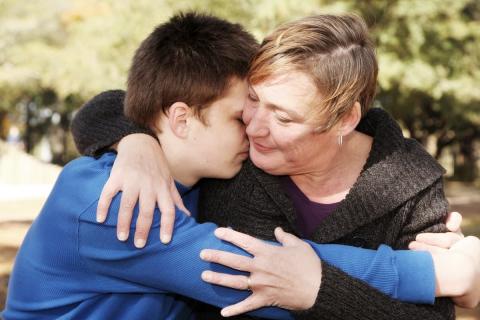In the past, like periods, the menopause was a bit of a taboo subject, something embarrassing or even scary that women had to deal with alone. But although menopause stigma still affects many people, we are now beginning to talk more openly about menopause as a natural process that happens to more than 50% of the population.
Life doesn't have to be put on hold because of menopause. There's a lot that can be done to help manage symptoms, including making healthy lifestyle choices, trying different treatments and seeking support from healthcare professionals.
What is menopause?
Menopause means ‘the last menstrual period’. It’s a natural part of a woman’s life and usually occurs between the ages of 45 and 55, as a woman's oestrogen levels drop (although it can start earlier). This period of a women’s life when they start experiencing menopausal symptoms is called ‘perimenopause’
In the UK, the average age for a woman to reach menopause is 51 (this means they’ve not had a period for a year). Everyone’s different, but you can look at your family history to get an idea of when you might go through it. It's likely to be a similar age to when your mother or older sisters started theirs.
It's not only those who identify as women who will experience menopause. Some transgender men, non-binary people and intersex people or people with variations in sex characteristics may also experience menopause.
Even if you think menopause is likely to be a long way off for you, if you know what you might expect from the perimenopause it can help you be prepared when you do start to experience symptoms.
This video from the NHS has lots of helpful advice about the menopause. You can watch BSL videos about the menopause on NHS Inform here.
How will I know I'm experiencing the menopause?
Most women will experience menopausal symptoms, although some will experience few, or no, symptoms. But for some, they can be quite severe and have a significant impact on everyday life. It’s a good idea to be aware of what the symptoms are, so you can get treatment if they’re causing you discomfort.
The first sign of perimenopause (the time from the start of menopausal symptoms until your last period) is usually a change in the normal pattern of your periods. You may start having either unusually light or heavy periods. The frequency of periods may also be affected. They may occur every two or three weeks, or they might not occur for months at a time. Eventually, periods will stop altogether, although for some people other menopause symptoms may continue.
You may have heard about hot flushes being a symptom, but there are lots of other symptoms too, both physical and emotional, including:
- 'brain fog' and memory issues
- difficulty sleeping
- fatigue
- hot flushes
- joint aches
- loss of sex drive (libido)
- low mood or anxiety
- migraine
- night sweats
- vaginal dryness or pain.
For some people, the emotional symptoms can start several years before any physical symptoms.
You can find out more about the symptoms of menopause on the NHS Inform website.
What if it comes early?
We tend to think that menopause only happens to people in their 50s, but in fact it can happen at any time. Around 1 in 100 women under 40 experience menopausal symptoms. This can happen naturally, or as a result of surgery or treatments. For women who would like to have children, early or premature menopause can be very upsetting, as it affects your fertility. But there’s lots of support available through your GP’s surgery, and from organisations like the Daisy Network and the Fertility Network.
You can find out more about early and premature menopause on the NHS Inform website.
How can I manage my symptoms?
This might all sound a bit daunting but don’t worry. If you do have symptoms, you don’t have to put up with them. There are things you can do to help, like exercising regularly and eating healthily, and there are also treatments available to make things better, like hormone replacement therapy (HRT). You can read more about these treatments on the NHS Inform website.
Talk to your doctor
Some people feel uncomfortable about the idea of talking to their doctor about the menopause – particularly about the more intimate symptoms, like heavy periods, loss of sex drive and vaginal dryness. But your doctor is there to help – and nothing you say will come as a surprise to them! So do make an appointment with your local GP practice if the symptoms are worrying you or interfering with your daily life.
Talk to your partner
If you have a partner, it’s important to talk to them too. so that your partner and/or other family members understand what you’re going through and what they can do to help.
They may find it hard to get their head around it all at first, but they’ll want to support you. So let them know what they can do to help you, whether this is practical help like taking on more household tasks, or emotional support. You can find some tips for partners further down the page.
Talk to your children
How much you tell your children about the menopause will of course depend on how old they are. However, children start learning about puberty from around P5, so from this age they may well have some understanding of how our bodies change as we grow older.
The main thing to let them know is that, even though you may feel down or unwell at times, you are okay, and that this is something perfectly natural that most women will go through at some point. This will help calm any fears they may have about you being ill.
You could also talk to them about mood swings and explain that if you get upset sometimes it doesn’t mean they’ve done anything wrong. Depending on how old your child is, they may understand mood swings all too well!
You could also help them feel less powerless by suggesting ways they can help and support you. This could be as simple as having a quiet cuddle on the sofa, bringing you a glass of water or cup of tea or taking more responsibility for chores around the home.
Talk to people at work
If you feel you need support at work, it’s a good idea to talk to your manager or colleagues. They will be able to make adjustments to how or where you work to help you manage your symptoms. For example, they might let you make changes to your uniform if it’s uncomfortable, provide you with a fan or a quiet place to rest, adjust when you take your breaks or let you work from home if that’s possible. Some organisations even have a ‘menopause champion’ you can talk to.
The NHS Inform and ACAS websites have more advice about your rights at work and how employers can support you through the menopause.
Can menopause affect my mental health?
Because your hormones change during menopause, this can affect your mental health, causing mood swings, anxiety, irritability, lack of confidence and even depression in some women. Menopause can also disrupt your sleep patterns, and as we all know, lack of sleep can be tough to deal with. Some of the changes can affect your confidence and self-esteem too.
It’s important to remember that mental health symptoms like anxiety are just a ‘real’ as physical ones like hot flushes, and can be treated too. So talk to your doctor about all your symptoms and see what they can do to help. You can find out more about mental health and the menopause on the NHS Inform website.
It’s also really important to take good care of yourself. Things like exercising, getting some quiet ‘me time’ and spending time with friends will all help you feel better. Connecting with other people who are also experiencing menopause, sharing stories and having a laugh, may also help – for example, you could see if there’s a Menopause Café near you.
That said, it’s not all bad. Some people find the menopause a liberating experience – no more PMS, for a start. And you may find it gives you a chance to make other changes to your life to make things better.
Can I still have sex?
Yes! Some people think that menopause means the end of your sex life, but this isn’t true. Although some of the hormonal changes of menopause may alter the way you experience sex and your body, there’s lots you can do to create a happy and pleasurable sex life that feels right for you.
If you’re experiencing any problems with sex, like vaginal itchiness, dryness or soreness, don’t be embarrassed to talk to your GP about it. They’ve heard it all before and they’ll be able to prescribe treatments that can help you get your sex life back on track.
You can find out more about sexual wellbeing and intimacy during and after menopause on NHS Inform.
My partner’s going through menopause – how can I help?
If you’re a partner reading this, there’s lots you can do to support your other half. Gone are the days when women went through menopause alone! Everyone experiences menopause in a slightly different way, but here are some tips that may help:
Tip #1: Get informed
It’ll help you help your partner if you read up about menopause so you’re better informed – you could start by looking at the NHS Inform website. Let your partner know that you’re there for them, and that you’re both in this together.
Tip #2: Listen and talk
Menopause is different for everyone so even if you’ve done a great job getting informed, don’t assume you know what your partner’s experiencing. Take time to listen to what they have to say and to talk things through together.
In this short video, Clinical Director Jason Leitch has some more advice for partners.
Tip #3: Be encouraging and supportive
The changes menopause brings may make your partner lose confidence and feel self-conscious, or not feel like doing things they’d usually do. Gently encouraging them will help them feel better about themselves. You could also try doing things together that may help, like going for a walk, cooking a healthy meal or trying some mindful breathing exercises.
You might also find that the way they feel about sex changes, so it’s important to be understanding, and to talk things through and explore new ways to be close and intimate.
 Activities & Play
Activities & Play Behaviour
Behaviour Childcare
Childcare Development & Growing Up
Development & Growing Up Family, Friends & Relationships
Family, Friends & Relationships Feeding Your Baby
Feeding Your Baby Food & Eating
Food & Eating Health & Safety
Health & Safety Mental Health & Wellbeing
Mental Health & Wellbeing Money & Work
Money & Work Online Behaviour & Safety
Online Behaviour & Safety Pregnancy & First Days
Pregnancy & First Days School & Education
School & Education Sleep
Sleep







 Mental Health & Wellbeing
Mental Health & Wellbeing
 Online Behaviour & Safety
Online Behaviour & Safety